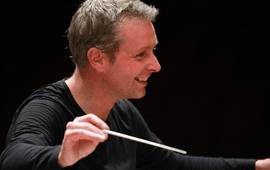> [Archived] Interviews

An Interview with the Conductor Alexander Liebreich
In 2013 Alexander Liebreich was appointed conductor of the Polish National Radio Symphony Orchestra and he has been the artistic director of the Tongyeong International Music Festival (TIMF) in South Korea since 2011. He is also the artistic director of the Munich Chamber Orchestra. The artistic activity of the conductor Alexander Liebreich includes some unusual projects in terms of repertory.
Mr.
Alexander Liebreich, only a few days ago you concluded at the
Frankfurt Opera a series of seven performances with Oedipe
by
George Enescu, a work which is not very well-known. When was this
project initiated?
I first came across this work two and a half years ago, when I was asked to look into the score of the opera Oedipe by George Enescu. I discussed the project with the director Hans Neuenfles in both Frankfurt and Berlin. We listened to recordings and we reread the play Oedipus by Sophocles. We tried to fathom the entire history of the play and we pondered over the best manner to approach this subject.
The
musical and the philosophical language of the opera are very complex.
But what was your own approach?
The first step was by means of the audition of the recording made by Lawrence Foster, the version in French. And the second was reading the myth of Oedipus by Sophocles, in order to see the big picture. I thought over the meaning of Oedipus in general and for me, personally, over what I find most dramatic and interesting in the play. I discussed with the director Hans Neuenfels so as to discover what would be relevant to the performance.
The
first performance took place on the evening of 8th
December, 2013. How did you choose the cast?
We have met a few of the artists before. This wasn’t my first collaboration with the director Hans Neuenfels; we also worked together on Othmar Schoeck’s Penthesilea, two years ago. It was then that we met the baritone Simon Neal who interpreted Achilles and Tanja Baumgartner who played the part of Penthesilea in Schoeck’s opera. We were certain that the two artists were also a good match for Oedipe: the role of Jocasta is interpreted by Tanja Baumgartner, and Simon Neal is Oedipus. We used the same team that we had had for Penthesilea in the case of Oedipe because we trusted each other and we had worked well together. This was the first step. Then, the other artists, whose roles are not as difficult and complex as the protagonists’, were chosen by Bern Loewe, the intendant of the theatre. Katharina Magiera was chosen for the character of the Sphinx. The other feminine roles are not as complex as the masculine ones, such as Phorbas. The deep masculine voices dominate Enescu’s score, while the tenor is missing.
You
chose to interpret the opera not with the original libretto, but in
another version. Who translated it into German?
The translator was Henry Arnold, who was also part of the team for Penthesilea. It was the director Hans Neuenfels who decided to make a German version, which could better reach the audience. Not everybody understands French. With a German version, the audience would feel more connected to the drama.
Can
you offer us a few details regarding the direction of the
performance?
The
direction – given
that I have known Hans Neuenfels for 4-5 years and three previous
projects – is not meant as a challenge. He has no wish to be
l’enfant
terrible,
but he’s very serious when it comes to the artists’ interaction
on stage. The musical tension is also present in the singers’
acting. In general, it is more conventional, telling the story of
Oedipus, which is an extremely exciting story. The costumes are
beautiful, sometimes with influences from the punk fashion. Oedipus –
the protagonist – is a professor, a man of science. In general, the
costumes are conventional, with influences of the Antiquity.
What
was the reaction of the audience to such an unusual score?
The last performance, which took place on 5th January, 2014, was sold out. With each performance, the audience was more and more interested. Some of the music lovers who came to listen to the complete score, especially that of the fourth act, were perhaps disappointed. The audience was numerous, but for those used to French, it was maybe a little disappointing. All in all, I believe it was a success and it’s sad that the work isn’t part of the regular repertory and that it’s not well-known. In Germany it’s not very often interpreted. The audience listening to it for the first time, in Frankfurt, was quite impressed with this performance.
Translated by Mihaela Olinescu and Elena Daniela Radu
MTTLC, The University of Bucharest














